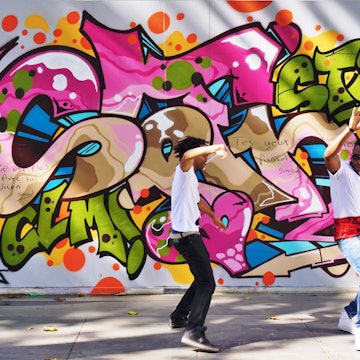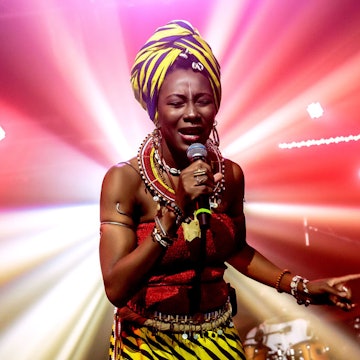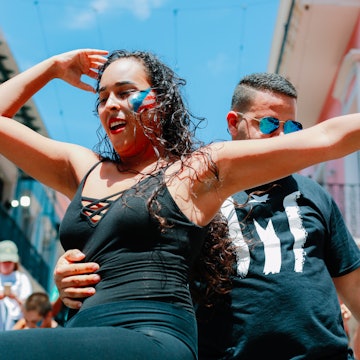

Patti Smith performs at Parco della Musica in Rome. Virginia diGaetano for Lonely Planet
With Patti Smith's The Melancholy of Me & You out November 4, 2025, we look at how her live shows have become a kind of homecoming for fans worldwide and especially one Lonely Planet writer.
“I’m going to see Patti!”
“Aw, Patti! I wish I was there with you!”
I don’t know how many times I’ve had some version of this conversation with Aunt Chris. Aunt Chris who always picked me up in the middle of the night, from somewhere I shouldn’t have been; Aunt Chris who always held a lifeline open when every other door was closed.
And always with her, in some way, Patti Smith. While other kids were dancing the Hokey Pokey in kindergarten and learning how to write their names inside of their winter jackets, I was dancing to Horses and learning how to scribble poetry on my jeans. By the time I was a teenager and got kicked out of suburban New York high school for being a truant, I was already on Aunt Chris’s night owl schedule; we spent hours lying on the couch talking about concerts she’d gone to and people she’d seen in the crowd. William Burroughs, Allen Ginsberg, Debbie Harry. Names that went so far beyond us, crossing the world in recognition. But in those days, they were people that she’d touched, that had all sweated together in steamy clubs with questionable zoning laws.

I could rattle off the names of those clubs when I should have been learning short division. I still have a hard time with square roots, but I can tell you that Patti Smith played at the Bottom Line, the Palladium, the Hayden Planetarium and a far-off venue on Long Island called My Father’s Place. Patti both opened and closed the legendary CBGB club on the Bowery, and Aunt Chris was there for most of the nights she played in the 1970s. When I went there years later to see other people play other songs, I always looked for some evidence of them both on the pockmarked concrete of that too-small stage.
Patti Smith, the fil rouge, the connective tissue between first days of school, childhood crushes, adolescent angst and the mosaic that becomes a fully formed life. I know her voice better than most of my family and could pick it out of hundreds. I carried Horses with me first as a cassette tape through Lower East Side squats, then as a CD in Southeast Asia, and later as a downloaded file on a phone in Italy. It was and is a talisman, a compass safely tucked into my pocket with a gravitational force that leads straight to home. Building my life in Rome after wandering for decades was probably due in no small part to Patti’s frequent visits to Italy and the unspoken assurance that at least once a year, we’d meet again here, somewhere.
When I found out that she would be doing a small tour in celebration of the fiftieth anniversary of Horses and that the only date in Italy would coincide with the time in which Aunt Chris and Uncle Joe would be visiting me here, I didn’t hesitate for a second. I immediately bought the best two tickets left in the hall, the best train tickets I could find to the northern city of Bergamo where the show would be, and a hotel room directly across from the venue. I spent far more money than I should have. I didn’t care. It would be the first time we saw Patti together.
About a month before the Horses show, Patti is passing through Rome again like the vicar who stops in occasionally to grab a cup of tea and check on her flock. I am there, and I watch the crowds make their way toward the glossy Parco della Musica in the northern part of the city on a sultry mid-September evening, where Patti is performing as part of the Roma Summer Fest.
Italy, and Rome in particular, is still the type of place where you can find live music of almost any genre on almost any day. Patti fits in perfectly here because her fans have the largest age range you could possibly imagine: couples in their seventies line up next to twentysomething friend groups with poetry written on their jeans, and everyone has the same sense of anticipation running across their faces. They’re wearing heels and sandals, sneakers and combat boots. Everyone is at home.
I’m here alone, but I’m meeting my friend Barbara before the show. She’s come with her mother, who is seeing Patti for the first time. We chat in the bar next to the entrance, where I can hear the opening lines of Horses coming out of a speaker underneath the pulsing din of collective conversations. I’d know that voice anywhere.


I leave them to finish their drinks and I find my seat near the stage, which is set up in the open-air Cavea, the very center of the Parco della Musica. The fine Nordic wood and sophisticated curves of the concert hall, designed by famed Italian architect Renzo Piano, normally play host to classical repertoires or operatic tenors. It’s a smooth, unblemished space with genteel corridors, not one that you might normally associate with a woman who once slithered on stage like a snake in 1970s New York. But Patti transforms whatever venue she performs in, making it into her own intimate space, no matter how old, new, lush, or rough it may be. The delicate curves of the amphitheatre, so frequently host to fashion shows and convention crowds, become hers even before she takes the stage. She’s performed here before, as part of the tenth anniversary of its birth. That same year, she performed at the Vatican in front of Pope Francis, inhabiting that space with the grace and reverence that defines her, as equally as does her defiance. I was there, both times; it was the same year that I moved to Italy, looking for my own space.
I call Aunt Chris and tell her the concert is about to start; she wishes she was here.
I’ve seen Patti alone more often than not: at the Centrum in Oslo, the Peace fest in Paris, the Armory in New York. But I don’t consider it a secret sort of ritual that cannot be shared, or a communion I should jealously guard. I watched her at the Roman Theatre in Ostia with Agnes, Sophie and Desiree; Monica and I saw her fill up St. Mark’s Square in Venice. Each time has been different and remarkable, and the people with whom I have shared those moments occupy an almost untouchable space in me. Maybe it’s because I cry when I see Patti, every time and without any restraint or shame. After all, once you’ve cried with someone, no matter how many tears or where they come from or where they go, you are together.

I cried the first time I saw her sometime in the late '90s, not long after Patti returned to performing after her own long absence. She was already imprinted on me from years of dancing barefoot with Aunt Chris in the various places she lived before she settled down to raise my cousins. I struggle to remember the exact place, but I know it was outdoors, and I know it was in New York. I struggle to remember how I got there, how I got back, or where I went back to when the music was over.
By the time Patti returned to performing in 1994, I was battling addiction, homelessness and crippling depression. I would find Aunt Chris at her office in front of the World Trade Center in New York, where she would feed me and send me off with pocket money that she knew I’d spend in the wrong places. She was the only one who would see me, who could see me; the only one who had the courage to reach into the dark to try to find me. Aunt Chris was my lifeline in those days, and Patti Smith was our North Star, the point in the sky that led us back to each other. We’d sit on the bench outside of her office and talk about concerts or songs like no time had passed, and in those tiny moments, I felt tethered again.
The Parco della Musica is nearing capacity and right before the music starts I head to the softly lit, pristine bathrooms, a concert luxury that does not go unnoticed. Women’s bathrooms are a true demilitarized zone, where we give each other grooming tips and relationship advice in the space it takes for us to wash our hands. I find a 20-something from Belgium talking to a Venetian woman in her 60s about how they’d both traveled to Rome just to see Patti. Pa-t-t-i Sm-ith. They pronounce her name with an articulation I’ve never possessed, but a reverence I know well. They’re talking about how good the lighting is in the bathroom and one compliments the other on her hair while the other asks for recommendations for bars after the show. There is peace.
By the time I’ve reached my seat I know I won’t be seated for long: as soon as the lights go down and the band appears, people are standing up and running toward the stage. It’s an almost universal constant for the Patti Smith Quartet, no matter how tenacious the security. Everyone needs to get close to Patti, to commune with her. She appears in the black blazer that’s become her trademark in recent years, a familiar uniform that fills me with gratitude. The Patti I know.


The show started with what is normally one of her final songs, People Have the Power. I can’t hear that song without thinking of my cousin Alana dancing on Aunt Chris’s couch, no more than four years old. It’s a song that rouses people and unites them, but to me, it is Alana’s song. The tears flow easily, and I am in the crowd of people standing in front of the stage. Have you ever seen a seventy-year-old storm a band stage and refuse to sit when a beefy security guard tries to guide them back? It’s magnificent, and Patti doesn’t miss a beat announcing that there was no reason to make people move back. She would direct the crowds back to their seats from time to time, lovingly.
“We’re gonna prove to the world that we can all work together,“ she says, looking down at the guards and forcing them to look back at her. She is an embodiment of an idea, aware of her power and armed with her humanity. Everyone listens, and the bouncers back down.
She does a searing rendition of Bob Dylan’s Masters of War, her howl ripping open the earth while her hands shake in anger. Patti has a way of crumbling and coming back together again in the space of an interlude; she can change tones, moods, and direction without ever losing the fil rouge that connects the entire performance.
The band plays Break It Up, one of the songs from Horses, and it sends a surge up my spine. It’s a tiny preview, an Easter egg for those who know. I think of the upcoming tour, the moment that will tie together so many of the different threads that, although occasionally frayed, have become the fabric of a life. My life, vastly larger than I could have ever imagined, than I would ever have thought possible. And I’ll be there with the one person I couldn’t imagine doing any of it without.
Patti is electric throughout a nearly two-hour set, charging the space with a vitality that seems to defy her 78 years. She pogos, she hops, she pounds her fist in the air, possessed by something that totally eclipses the concerns of age. For she is a chrysalis, constantly evolving and forming into something eminent. Perhaps it is this that so many people recognize in her, why people travel from all of these places to see her and why I find myself holding on to her like a child tracing a kite across the sky. She is an ever greater total than the sum of her parts, and for anyone, any of us who have ever doubted our worth, or weighed our faults heavier than our gifts, or wondered if we would ever be good enough to turn our heads toward the sun, she answers back: Live!
Patti and her son, Jackson, play together on stage, and they are presented with a guitar made by incarcerated people near Naples from wood salvaged from a migrant ship. They baptize the instrument that she calls “holy,” and the sound resonates across Renzo Piano’s mighty curves. Even the security guards stand in rapt attention; maybe they, too, have had questions about themselves, maybe they, too, feel closer to the answer. I cannot help but wonder if that is why we go these great distances, why we yearn so deeply to travel. Maybe we’re just looking for each other.
The finale is one of her most iconic songs, Gloria. It’s the first time I’ve ever heard it live, and Patti is luminescent, not twenty feet in front of me. "Jesus died for somebody’s sins, but not mine." The snarling, vicious opening line that’s been interpreted and misinterpreted for decades, written as her declaration of independence from organized religion. I remember singing it to myself as I lay in a hospital bed, nearly dead from a heroin addiction. I sang it over and over again in the darkness. At the time, I sang it as proof that I was beyond saving, that not even Aunt Chris could help me out of that hole. But I got out, and I crawled back. And Patti was there, fighting for me even if she’ll never know. Fighting for Aunt Chris, fighting for the clouds to clear and the North Star to emerge in the sky.
As the band leaves the stage and the crowd streams out of the auditorium, I look for Barbara and her mother. They’re standing alongside euphoric throngs of people carrying posters of Patti’s long-ago face captured by her friend and muse, Robert Mapplethorpe. They are both ebullient, shimmering with emotion after the show. It’s a beautiful sight, replicated all over the concert grounds, and fills me with an illogical but overwhelming sense of pride. I am grateful that Patti still moves people, still unites them under that shared moment.
Although it was a long way, I walk home from the concert, tears streaming down my face on a hot September night where no one would have noticed anyway. I take out my phone and write to Aunt Chris.
I send her a photo of Patti, our Patti, illuminated against the night. “Patti.”
Aunt Chris writes back, immediately, with a heart. “Patti.”
Almost exactly a month later, I am standing at the platform of Rome’s cacophonous Termini station, waiting for the train to Bergamo. An official sort of man comes to me with an overextended clipboard, an empty wheelchair, and a confused expression.
“Excuse me, didn’t you order a wheelchair for a Ms. Christine?”
“Yes sir, I did. But it isn’t necessary anymore. Ms. Christine isn’t coming.”

You see, while Aunt Chris was saving me all those years near the World Trade Center, something was coming for her. She spent years working there after the towers fell in 2001, and the toll it’s taken on her health is catastrophic, making the simplest tasks often insurmountable. As much as she wanted to travel, the stress of it was simply too much on a body that has shouldered so much more than she ever asked for. As much as I know she wanted to be here, my heart wrenches as I board the high-speed train and take our seats in the fancy cabin I knew she’d love. My stomach lurches when I arrive in the high-tech hotel to see two twin beds perfectly arranged for chatting into the night. And my throat opens up like a rusty drawbridge when I arrive at the Chorus Life Arena to see two empty seats, stage right. I very nearly didn’t come, and in a world where non-refundable purchases exist, I may not have: but this wasn’t about me. I came to Bergamo for both of us, for all of us.
I don’t know if Aunt Chris and I will ever get to see Patti together, because there isn’t any guarantee for any of us. We don’t get to choose when we lose who we love, or when limitations will overtake our aspirations. We don’t have any warning, but even if we do, the pain of grief is something far greater than we’re prepared for. We may never get to take that trip that we’ve always dreamt of or be that version of ourselves that we see in the photos of our mind. And despite our very best efforts, or the very deepest recesses of what we hold in our hearts, we may never get to be with the people we love the most.
But we do choose how to love whilst we live, and where to seek it out when we are lost. We find it, and we find it again, even if it is bound to be lost. The point is only to find it, to find each other. I find Patti over and over again, in ancient Roman amphitheatres, Paris concert halls and lying in the grass in Ljubljana. I know I’m not the only one, either; her always-full and always-raucous concerts are only one bit of proof. Patti carries me home, to where Aunt Chris is waiting late at night for me to come through the door, as irreplaceable to me as I am to her. She is the ship, bowed yet unbroken, bravely forging on.
I take my seat in Bergamo early and listen to warm-up songs from Jim Carroll, the poet who I used to wait on when I worked at a diner in New York. I laugh at the memory of him asking for blueberry pancakes and maple syrup every time he came in, and the way I never told him that I knew who he was. I let tears stream down my face and embrace the vision as a great gift that no disappointment can tarnish. The room fills and the lights dim, and an old friend emerges from the darkness. I’d know that voice anywhere.
Jesus died for somebody’s sins, but not mine…














